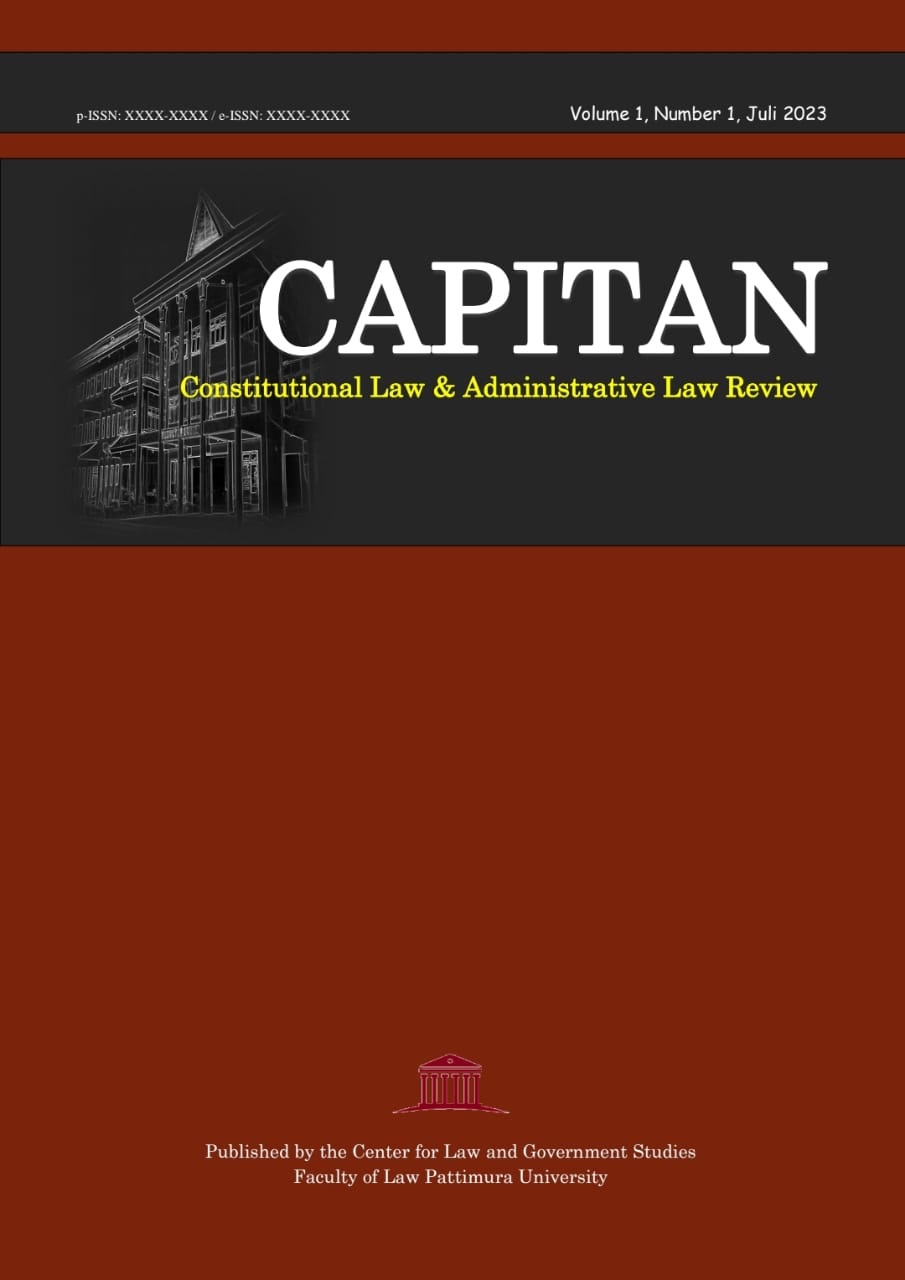Perpanjangan Masa Jabatan Pimpinan Komisi Pemberantasan Korupsi Republik Indonesia Berdasarkan Putusan Mahkamah Konstitusi Nomor 112/PUU-XX/2022
Abstract
Review of Law No. 19 of 2019 concerning the Second Amendment to Law No. 30 of 2002 concerning the Corruption Eradication Commission. Constitutional Court Decision No. 112/PUU-XX/2022 whose decision accepts all of the applicant's requests. The Constitutional Court is not a fully democratic state institution, because the people do not directly elect the members of the court, and the term of office is more or less closely related to the domain of formulating open legal policy. The leadership of any institution in terms of extending its term of office must be carried out through the law-making council, namely the legislative body. Because officially this institution is appointed as the people's representative, including having a process of public participation. Changes to the terms of office from 4 years to 5 years, as in Law No. 30 of 2002 Article 34, during the process of changing the extension of the term of office of a state institution, it should be given to state institutions that have involvement in the process of drafting Legislative Regulations, which in turn expressly stated in the 1945 Constitution. This normative juridical research was carried out using a statutory approach, conceptual approach and case approach. In its decision, the Constitutional Court made new norms that are regulatory in nature and do not take into account the opinions of the People's Representative Council and the Government, which is an abuse of authority or is done arbitrarily and exceeds the authority of the legislators. This decision is contrary to the 1945 Constitution of the Republic of Indonesia Article 5 Articles 20 and 28 I. As a result of the Constitutional Court's decision being retroactive, problematic and subject to multiple interpretations, if there are parties who justify the decision regarding the existence of the leadership of the Corruption Eradication Commission while in office, theoretically it is feared that it will trigger another petition.
Downloads
References
Bachtiar, Problematika Implementasi Putusan Mahkamah Konstitusi pada Pengujian UU terhadap UUD, Jakarta: Raih Asa Sukses, 2015.
Bagas P Siregar, Membaca Kekaburan Isu Konstitusional Dalam Putusan MK, https://www.linkedin.com/pulse/membaca-kekaburan-isu-konstitusional-dalam-putusan-mk-bagas/.
Cindy Rizka Tirzani Koesoemo, “Eksistensi Komisi Pemberantasan Korupsi dalam Penanganan Penyidikan dan Penuntutan Tindak Pidana Korupsi”, Jurnal Lex Crimen Vol. VI, No. 1, Jan-Feb, (2017).
Indra Rahmatullah, “Rejuvinasi Sistem Checks and Balances dalam Sistem Ketatanegaraan di Indonesia”, Jurnal Cita Hukum, Vol. 1, No. 2, (2013).
Josua S Collins, Mengenang Kembali Putusan Mk Yang Retroaktif, https://advokatkonstitusi.com/mengenang-kembali-putusan-mk-yang-retroaktif/2/.
M Addi Fauzani, Mengkritisi Pertimbangan MK Tentang Perpanjangan Masa Jabatan Pimpinan KPK https://theconversation.com/mengkritisi-pertimbangan-mk-tentang-perpanjangan-masa-jabatan-pimpinan-kpk-207209.
M. Addi Fauzani, Mengkritisi Pertimbangan MK Tentang Perpanjangan Masa Jabatan Pimpinan KPK. https://theconversation.com/mengkritisi-pertimbangan-mk-tentang-perpanjangan-masa-jabatan-pimpinan-kpk-207209, diakses 26 Agustus 2023.
M. Beni Kurniawan, “Problematika Dalam Pengisian Jabatan Pimpinan Komisi Pemberantasan Korupsi”, Jurnal JIKH, Vol. 12 No. 2, (2018).
Moh. Mahfud MD, Pergulatan Politik dan Hukum di Indonesia, Yogyakarta: Gama Media, 1999.
Muh. Ikbal, MK Perpanjang Masa Jabatan Pemimpin KPK Pakar Hukum Tata Negara Problematis Dan Multitafsir, https://fajar.co.id/2023/05/28/mk-perpanjang-masa-jabatan-pemimpin-kpk-pakar-hukum-tata-negara-problematis-dan-multi-tafsir/3/.
Muh. Ikbal, MK Perpanjang Masa Jabatan Pemimpin KPK Pakar Hukum Tata Negara Problematis Dan Multitafsir, https://fajar.co.id/2023/05/28/mk-perpanjang-masa-jabatan-pemimpin-kpk-pakar-hukum-tata-negara-problematis-dan-multi-tafsir/3/.
Muhammad Irham, https://fh.unpatti.ac.id/prinsip-prinsip-negara-hukum-dan-demokrasi/ .
Peter Mahmud Marzuki, Penelitian Hukum, Jakarta: Kencana, 2007.
Refindie, Anomali Asas Non-Retroaktif Dalam Putusan MK Perpanjangan Jabatan Pimpinan KPK, https://www.hukumonline.com/berita/a/anomali-asas-non-retroaktif-dalam-putusan-mk perpanjangan-jabatan-pimpinan-kpk-lt64bf766068098?page=2.
Refindie, Anomali Asas Non-Retroaktif Dalam Putusan MK Perpanjangan Jabatan Pimpinan KPK, https://www.hukumonline.com/berita/a/anomali-asas-non-retroaktif-dalam-putusan-mk perpanjangan-jabatan-pimpinan-kpk-lt64bf766068098?page=2.
Ridwan, H.R., Hukum Administrasi Negara, Jakarta: Raja Grafindo, 2006.
Copyright (c) 2024 Anshari Betekeneng, Renny Heronia Nendissa, Muhammad Irham (Author)

This work is licensed under a Creative Commons Attribution-NonCommercial 4.0 International License.
Authors who publish their manuscripts in this Journal agree to the following conditions:
- The copyright in each article belongs to the author, as well as the right to patent.
- Authors are able to enter into separate, additional contractual arrangements for the non-exclusive distribution of the journal's published version of the work (e.g., post it to an institutional repository or publish it in a book), with an acknowledgment of its initial publication in this journal.
- Authors are permitted and encouraged to post their work online (e.g., in institutional repositories or on their website) prior to and during the submission process, as it can lead to productive exchanges, as well as earlier and greater citation of published work.
- Authors have the right to self-archiving of the article (Author Self-Archiving Policy)













